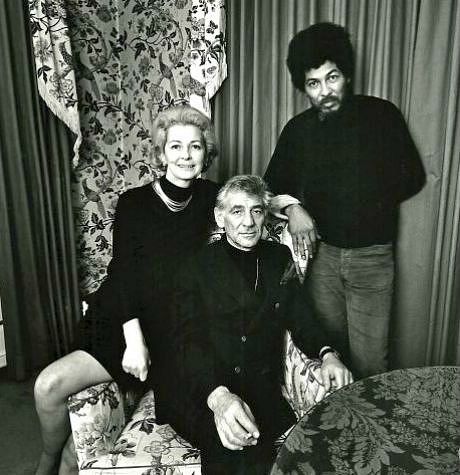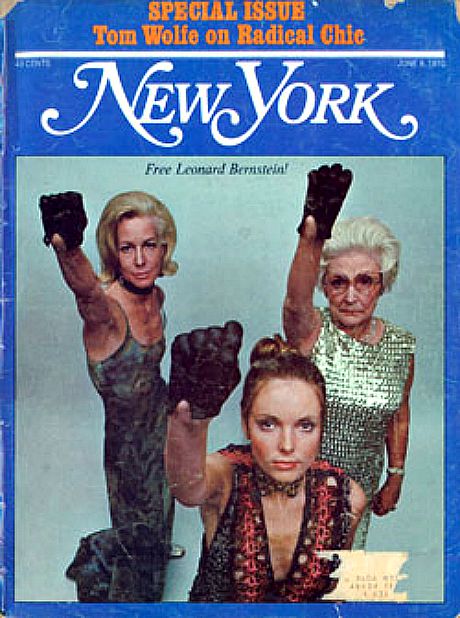From John DeFore‘s 1.23.15 Hollywood Reporter review: “A strong if only occasionally transporting biography of a movement that terrified the establishment in its day, Stanley Nelson’s The Black Panthers: Vanguard of the Revolution (PBS Distribution, 9.2 in NYC) speaks to many former members of the Black Panther Party about what its breed of revolutionary activism felt like at the time. Straight history is not the whole point here, as Nelson enthusiastically conjures a sense of what it felt like to be a Panther and to be a young black person inspired by them.”

Felicia and Leonard Bernstein and their guest of honor, Black Panther “field marshal” Donald Cox, during a fundraiser held at Bernstein’s Park Ave. apartment. The event was famously written about in Tom Wolfe’s “Radical Chic: That Party at Lenny’s.”
The film does not overlook various examples of “present-day relevance,” DeFore notes.
“We’re introduced to the young Huey P. Newton, who realized that it was legal to carry loaded guns in public and understood that doing so in the vicinity of police interacting with Oakland’s black population would draw more attention to racial justice issues than a million printed fliers. He and Bobby Seale organized the party, which began with a focus on militancy but soon launched major charitable programs, including a famous free-breakfast effort that fed children 20,000 meals a week.
“While he shows the power of the ‘Free Huey’ slogan, Nelson isn’t eager to investigate it; he tells us almost nothing about the incident that led to Newton’s imprisonment (he was accused of killing a policeman), nor does he give us any way of guessing whether it was just or unjust.
“The omission of such significant details is puzzling given that Nelson soon enough proves willing to show the group’s leaders in an unfavorable light. We watch in some detail as their intellectual star, Eldridge Cleaver, goes off the deep end following an armed standoff, fleeing to Algeria and eventually fracturing the party. And near the end, we briefly hear of Newton’s descent into drugs and erratic, criminal behavior.
“It’s tempting to conclude that the film is willing to be frank about the problems party figures caused themselves and each other, but the doc wants few shades of gray when it comes to antagonism between Panthers and the police.
“The film’s most involving bit of storytelling comes when the villainy of law enforcement is in no doubt. After detailing J. Edgar Hoover‘s fervor to destroy the group, it introduces the tremendously charismatic Fred Hampton, who in 1969 seemed poised to emerge as the kind of “black messiah” Hoover feared. Just as he was starting to build inspiring alliances between Panthers and activists in Latino and poor white communities, Hampton was killed in an FBI-engineered police raid that begs to be called a political assassination.”
DeFore doesn’t mention if Nelson pays any attention to “Radical Chic: That Party at Lenny’s” (6.8.70), Tom Wolfe‘s famous New York article about guilt among upscale liberal Manhattanites. “Lenny” was composer and conductor Leonard Bernstein, and “that party” — held at Bernstein’s Park Avenue apartment — was a Black Panther fundraiser attended by Donald Cox, a Panther “field marshal” from Oakland. Hilarious reading.
Knowledgable progressive women might have a slight problem with this film, given that the Panthers were never known for being enlightened feminists. I’ve gathered over the years that more than a few Panthers held views that echoed Stokely Carmichael‘s infamous 1964 quote, “What is the position of women in SNCC? The position of women in SNCC is prone.” The word that Carmichael was looking for was “supine,” unless the Panthers were into anal. (Sorry.)










